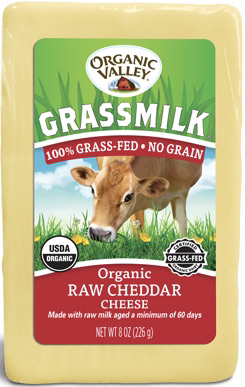June is observed as National Dairy Month. This celebration started in 1937 with grocer organizations sponsoring National Milk Month during the hot summer months order to distribute extra milk. In 1939, June was declared the official dairy month.
On June 4th, we celebrate National Cheese Day. National Cheese Day dates back to Monroe, WI in 1914. The holiday was created to boost tourism for what’s become one of the most popular types of dairy.
The exact origin of cheese is unknown. The University of Tennessee claims the earliest record of cheesemaking was found on clay tablets in southern Mesopotamia in 4000 BC. But others argue it goes back further. The National Historic Cheesemaking Center says there’s evidence of cheesemaking in Egyptian tomb murals, Greek mythology, and Neolithic ceramic sieves. Thees early practices were likely done by combining acidic fruit juice and milk or making containers from animal stomachs to store milk.
While the ancients practices of cheesemaking were all done sustainably, over time dairy became victim of industrialization like so many other foods. Today’s conventional dairy comes from cows which were raised in feedlots and fed corn, soy, and wheat for a good portion of their lives. Their feed is often genetically modified and sprayed with harsh pesticides. These cows were also likely given hormones and antibiotics. Fortunately, we now have many grass fed dairy options. These product come from cows roaming on opens pastures and being able to eat grass as their main source of food.
In alphabetical order, here are the 21 best grass fed cheeses:
5 Spoke Creamery 
5 Spoke Creamery began with Unilver food scientist and dairy cultures specialist Alan Glustoff when his employer had him work in Holland for a summer. While there, he fell in love with raw milk cheese. He and his wife Barbara, who was working in advertising, decided to go all in, purchasing and reviving a run down farm in Goshen, NY. Along with renovating the existing property, they also built a cheese making room with a European style cheese aging room underneath it. The name 5 Spoke Creamery comes from Alan’s lifetime devotion to bicycling. Their farm is 100% solar powered. 5 Spoke offers many cheeses with a good amount being types of cheddar.
Alexandre Family Farm 
Alexandre Family Farm founders and 5th generation farmers Blake and Stephanie Alexandre began a dairy in 1988 in southern California, where Stephanie grew up. With Blake always wanting to return to northern California, they seized upon a farm was for sale in Del Norte County in 1992. This location was just two hours north of the original Alexandre farm in Ferndale. In addition to Blake returning to northern California, this was also the chance for both Blake and Stephanie to return to the practice of organic grass grazing cows like their grandparents did. Another tradition they wanted to return to was raising cows with A2 beta-casein. The A2 beta-casein has been found easier to digest than the genetic mutation which is A1 beta-casein. Alexndre Family also prides themselves for being rerenerative. They’re certified regenerative by the Savory Institute‘s Land to Market and the Regenerative Organic Alliance program. They sell a wide array of dairy products, including their 100% grass fed cheddar cheese.
Barber’s Farmhouse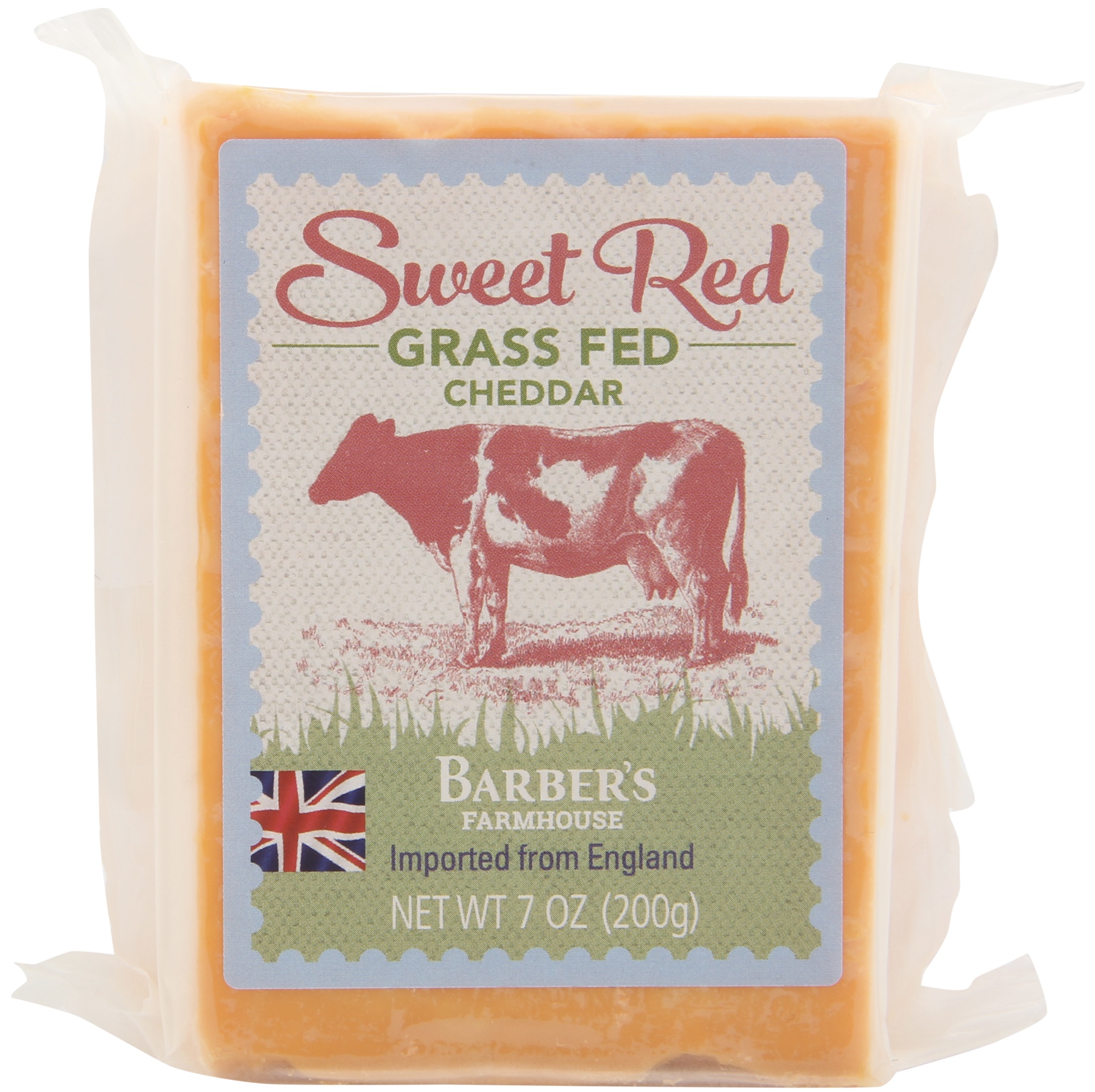
The Barber family is the oldest family in the world to still be making cheese. It all began with Daniel Barber producing cheese on his Somerset farm. Their cows today graze the lush pastures of Somerset and Dorset, which results in the cows giving a rich, creamy milk which is then turned into cheddar cheese. Barber’s Farmhouse begins their cheesemaking process by using a traditional cheese starter culture whereas today many cheese companies use freeze dried cultures in packets. Barber’s also supplies its cultures to other cheesemakers. The types of cheddar they offer are red, mellow, and cheddar aged 12, 18, and 24 months.
British Organic Dairy Co.

British Organic Organic Dairy Co. produces its cheese on a farm in Somerset, where cheddar originates from. British Organic Dairy is also a founding member of the organic dairy movement in the United Kingdom. Their organic farming is governed by U.K. and international law and independently verified annually by the Soil Association. British Organic Dairy’s cows graze on lush green pastures which are organic and free of any pesticides and herbicides. Their cheddar cheese comes in the varieties of mature, and extra mature, and vintage.
Clover Sonoma
Clover Sonoma originates back to 1916 when their milk was bottled and distributed by the Petaluma Cooperative Creamery. 1977, the Benedetti family became the owners of the Clover brand and are now a third generation family owned business. They partner with independent family farms across Northern California, the Rockies, and the Southwest, including family farms which have been in dairy for six generations. Clover Sonoma sets high standards for farms to partner with them as they requires that the family farms follow the Clover Promise of Excellence. They’re also the first dairy in the United States to receive the American Humane Certification. Clover Sonoma’s cheeses consist of pepper jack, sharp cheddar, medium cheddar, and monterey jack.
Cowgirl Creamery
After graduating from the University of Tennessee in 1976, friends and Cowgirl Creamery founders Sue Conley & Peggy Smith took a hippie trip to San Francisco. This was at the time when Bay Area restaurants and business were kicking off the farm-to-table revolution. Peggy worked at Chez Panisse for 17 years while Sue co-owned Bette’s Oceanview Diner. While at Chez Panisse, Peggy had the opportunity to learn about aged cheese through masters from Jean Piere Mouile, Jean & Pascal, as well employees of Neal’s Yard Dairy in London. In the early 1990s, Peggy & Sue were ready to start a new venture together, so they headed up an hour north of San Francisco to Pt. Reyes Station. They opened a wholesale distribution business called Tomales Bay Foods to connect West Marin’s farms and dairies with the top chefs in the Bay Area. Their facilities happened to be in a renovated hay barn in downtown Point Reyes and included a cheesemaking room. Their friend and mentor Ellen Straus of the Straus Family Creamery encouraged them to make their own cheese. Peggy & Sue were convinced it was the way to go and made cheese from Straus milk. After success with getting in to farmers markets, restaurants, supermarkets, creating award winning cheeses, and publishing a cookbook, they sold the business to the Swiss dairy company Emmi in 2016. The majority of Cowgirl Creamery cheeses are variations of triple cream.
Isle of Man Creamery
The history of Isle of Man Creamery spans over 100 years. Their first creamery was in 1919 in Spring Gardens, Douglas. After the Agriculture Marketing Act and Society was passed on the Isle of Man in 1934, a farmers cooperative was founded. In 1974, they built their current creamery in Tromode, right outside of Douglas. They officially became called the Isle of Man Creamery in 1996. Isle of Man is a now a cooperative of 31 family dairy farms. They no produce fluid milk, cheese cream, butter, and buttermilk. Isle of Man’s cheeses are exported all over the world. The cheeses are all cheddar, including unique varieties such as oak smoked, garlic & chive, and jalapeńo.
Ivy’s Reserve 
Ivy’s Reserve gets its name from grandmother Ivy Clothier. Around 1930, Ivy began using milk from cows her husband was raising to make a vintage cheddar. Ivy’s family, The Thorns, had been making cheese since the 18th, but Ivy brought in her own cooking skills to improve on her family’s recipe. She also had the advantage of milk cows grazing on the lush grass in the Somerset country. She produced a cheddar which was age for 18 months. Ivy followed with a farmhouse butter which was churned extra-slow to produce a smoothness with a clean finish. Today Ivy’s Reserve is still run by the Clothier family and cares for the farm and the animals the way she does. Continuing with Grandmother Ivy’s commitment to sustainability, Ivy Reserve has introduced the world’s first cheddar to be certified carbon neutral. Along with their vintage cheddar, Ivy also now sells a Somerset red.
Kerrygold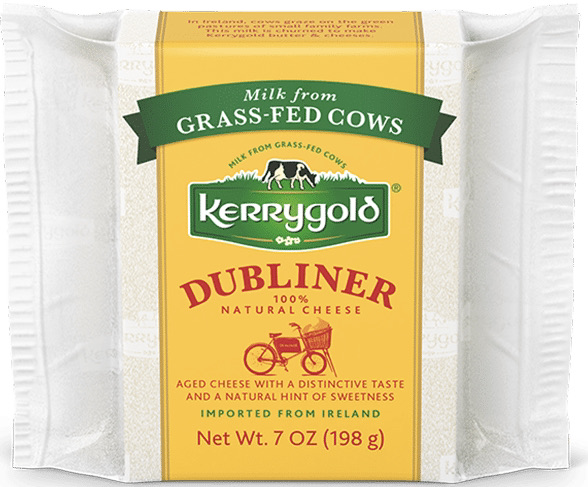
99% of farms in Ireland are family owned. Kerrygold is a co-op 14,000 family farmers. As a co-op, Kerrygold has its farmers in its best interest. They guarantee that the farmers are paid a fair wage. Being a dairy farm in Ireland, they’re the only country with a system with standards as high as their Sustainable Dairy Assurance Scheme (SDAS). The SDAS determines the standards for animal health and welfare, hygiene, land management, water usage biosecurity, and greenhouse gas emissions. All of the farms who participate in the program have their standards measured and are presented ways of improving their practices. Kerrygold’s cows graze on grass all day long for a large portion of the year. Grass makes up the majority of their cow’s diet along with a small amount supplementary feed for their health. Their cheeses come in many flavors, including a number with names based on locations in Ireland, such as Dubliner, Skellig, and Blarney Castle.
London 1856
London 1856 is another cheddar cheese brand to originate from Somerset, England. Founder Wilton Frank had success selling his family’s cheddar cheese in Somerset for several years. And then in 1856, a new rail lined opened, making it possible for is cheddar to reach the capital in London. London 1856 still uses Wilton Frank’s cheddar cheese recipe and ages it the traditional way. The current types of cheddar are mild, vintage, mature, and extra mature.
Lye Cross Farm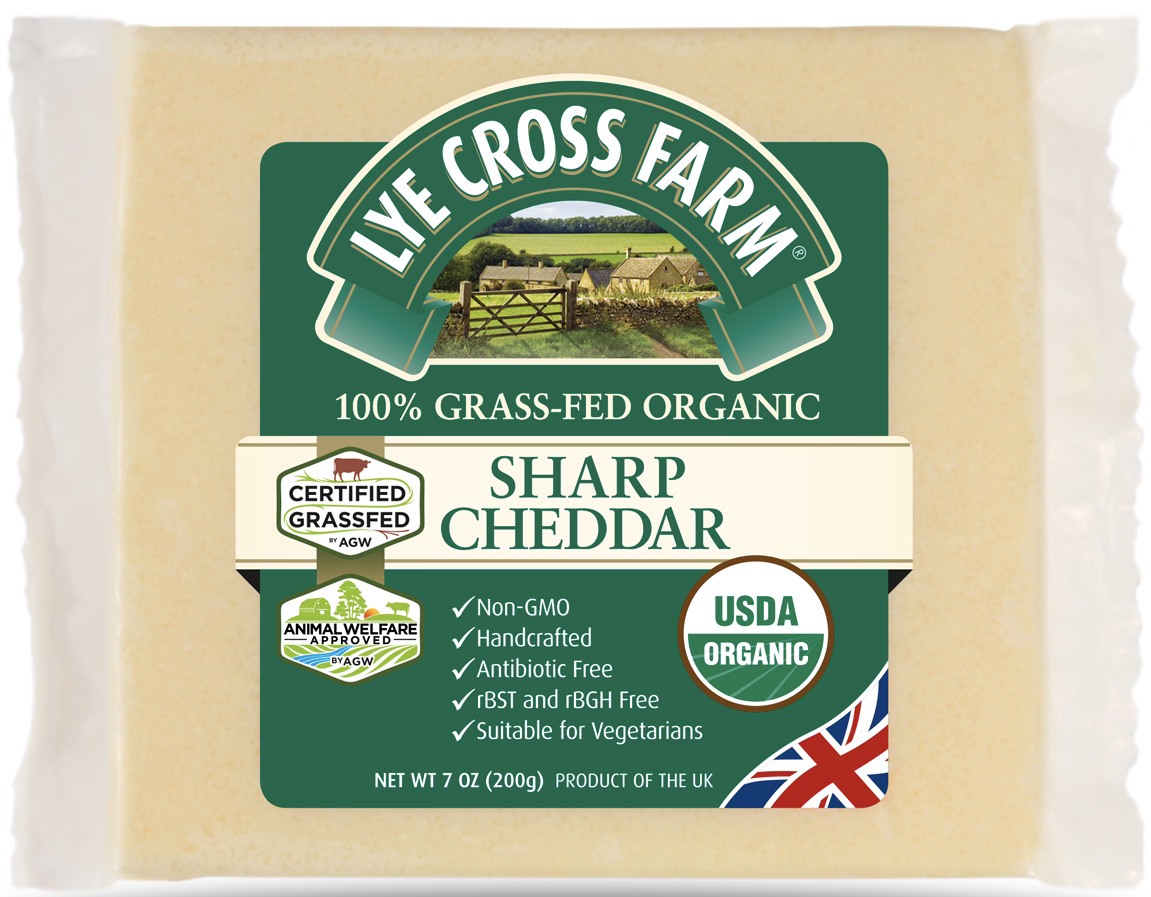
The Alvis family has been farming in Somerset, England for over 100 years. They’ve been making their Farmhouse Cheddar at the Lye Cross Farm since 1952. Their herd grazes freely in the fields below the Mendip Hills throughout the summer and are housed in the winter for warmth. Their animals are raised following the Five Freedoms of the English and Welsh charity The Royal Society for the Prevention of Cruelty to Animals. Those are freedom from hunger and thirst, freedom from discomfort, freedom from pain, injury or disease, freedom to express normal behaviour, and freedom from fear and distress. Lye Cross is working on reducing its carbon footprint by using a heat recovery system to mature its cheese, using solar energy to cool the cheese. The heat recovery system is also used to draw out excess warmth from the warehouse and naturally heat the water used to clean the cheese dairy. Cheddar is Lye Cross’s specialty with all of it cheeses. All of their cheeses are organic with two of their cheeses having A Greener World certification of being 100% grass fed and animal welfare approved.
McCall’s
McCall‘s prides itself on producing cheese from grass fed milk. They work with farmers to make sure the cows spend as much time during the grazing season as possible in the open pastures eating fresh, growing grass on Ireland’s rolling green hills. McCall’s choices for cheddar include the traditional 6 and 12 month aged plus the bold flavors of Irish whiskey, oak smoked, chive, porter, and sage.
Organic Valley
In 1988, seven Wisconsin farmers in the Coulee region were fed up with industrial chemical farming taking over the American agriculture system. They created a cooperative of family farms known as CROPP (Coulee Region Organic Produce Pool). The coop later became Organic Valley, specializing in organic dairy. In 1996, they moved into the meat industry. They were the first in the industry to ban animal by-products from a cow’s diet. Today, they’re a cooperative of over 2,000 farms in 34 states plus Canada and Australia. Their cows are on pasture 50% more than the USDA requirement. Three of their cooperative members are working a program called Climate-Smart Farming. Their goal is to raise the bar for carbon sequestration and greenhouse gas emissions and achieving carbon neutrality or hopefully a carbon-positive position. All of their Organic Valley’s cheeses are certified organic. They have a regular and sharp raw cheddar which come from cows with a 100% grass fed diet. Additionally, they have a wide selection of different flavors in their pasture raised cheeses.
Origin Milk
Consisting of farms in Colorado, Ohio, and Pennsylvania, Origin Milk practices holistic grazing methods and is Regenerative Organic Certified. Their farms are free of growth hormones, antibiotics, chemicals, and fertilizers. The cows roaming on their pastures are 100% grass fed and A2. Origin Milk comes in the offerings of fluid milk, cream, cheese, ghee, and butter. In terms of cheese, they have 12 different types ranging from cheddar to jack to soft cheese.
Raw Farm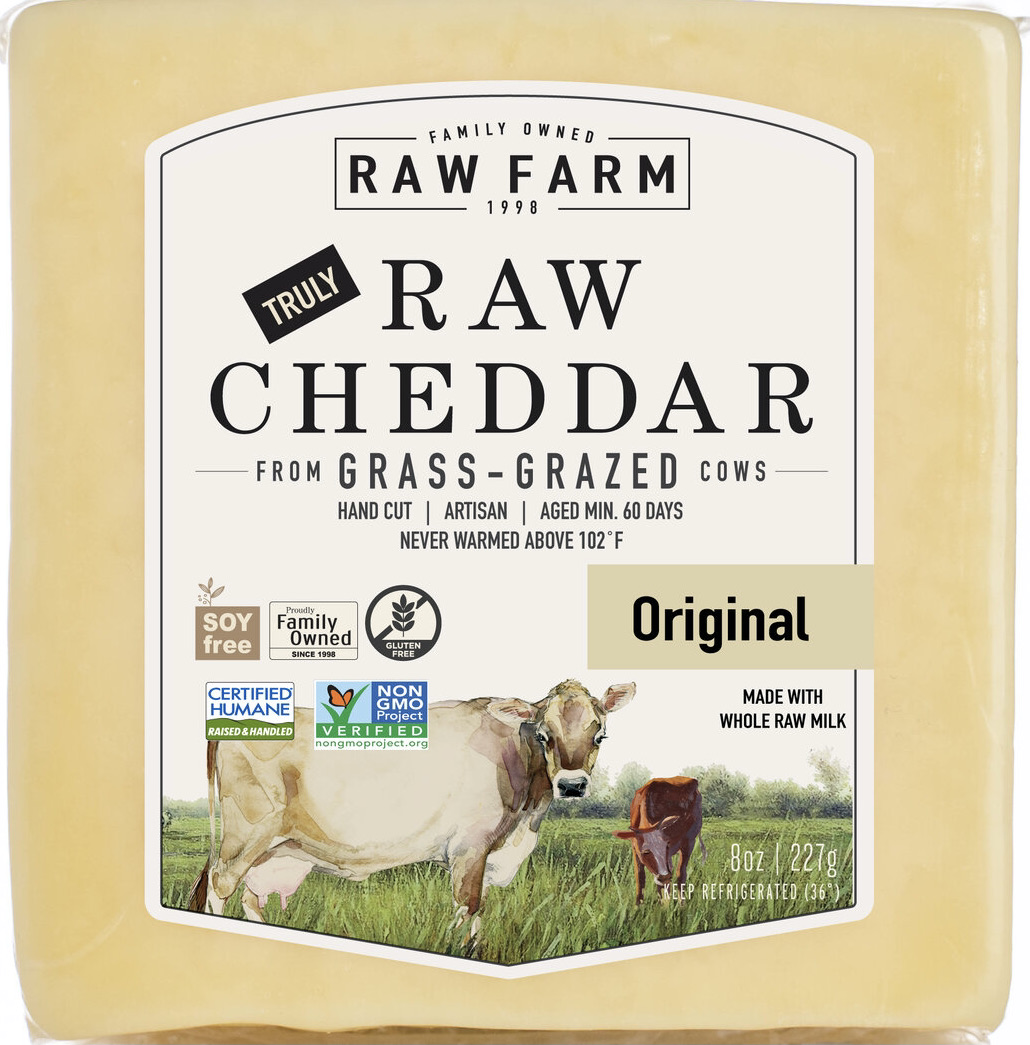
Raw Farm started in 1998 as Organic Pastures in Fresno, CA . Founder Mark McAfee discovered soon after opening the operations that the largest raw dairy in the world had folded. People began showing up at his ranch wanting milk which was raw and unpasteurized. Coming from working as a paramedic, Mark researched the principles of raw milk and was able to see the benefits in it. He learned that the deaths from raw milk were due to the milk becoming bad 120 years ago as the cows were raised in extremely unsanitary conditions. Milk started to be pasteurized instead of the farmers cleaning up their dairy farms. To properly remove dairy from pasteurization meant also removing the cattle from confined feedlots to open pastures to graze on as opposed to a diet consisting mainly of grain. They also needed access to clean water and sunshine and no hormones or antibiotics. Another important element of raw dairy is pathogenic testing to show that the cows are healthy. Raw milk contains beneficial bacteria not present when milk is pasteurized. Many people diagnosed with lactose intolerance are able to digest raw milk. Cheese is unfortunately the only raw dairy product which can sold legally across state lines. In 2017, Raw Farm began offering their cheddar nationwide. In 2020, they added a jalapeño flavored raw cheddar.
Rogue Creamery
In 1933, a cooperative of artisan creameries in Southern Oregon was formed and named the Rogue River Valley Co-op. Rogue Valley was a great location for raising dairy cows and producing cheese because of its healthy soil, large supply of water, and grazing pastures. Soon the Co-op caught the attention of cheese giants Gaetano “Tom” Vella & Celso Viviani. In 1935, the two acquired the Co-op and turned it into a successful cheese factory, renaming it the Sonoma Valley Cheese Factory, Plant No. III. In the early 1950s, their partnership dissolved and Tom renamed the plant Rogue River Valley Creamery. This is also the time that Tom visited Roquefort, France, learned about blue cheese making from the masters, and introduced blue cheese to The Creamery. In 1998, Tom’s son Ignazio “Ig” Vella inherited Rogue Creamery and sold it to local entrepreneur David Gremmels in 2002. Today, Rogue Creamery has a large number of different types of both blue cheeses and cheddars.
Rumiano Cheese Company 
Fred, John, and Richard Rumiano were American immigrants from Italy in the early 1900s. They first worked in goldmines, shipyards, and liquor before settling near Willows, CA and starting a dairy operation in 1919. Italian hard cheese wasn’t available anymore after World War I, so they created their Monterey dry jack to serve the San Francisco and regional markets. Over the years, the Rumiano Cheese Company expanded into more factories for manufacturing and packaging, launched into new markets all over the U.S. plus Europe, and Asia, and had its leadership passed down from one generation of the Rumiano family to another. In 2005, they became the first plant on the west coast to produce organic cheese at scale. Then in 2019, Rumiano Cheese introduced an organic raw cheddar which is never heated more than 102° F and aged a minimum of 90 days. Today they have a wide range of flavors from the popular Rumiano Family Organics to the bold Rumiano Redwood Coast lines.
Sierra Nevada Cheese Company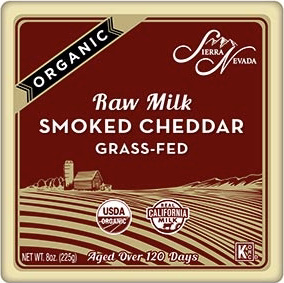
Sierra Nevada Cheese Company handcrafts organic dairy using milk which is free of hormones and antibiotics and comes from local farmers in Northern California. Ben Gregersen and John Dundon introduced the company in 1997 by selling the cheeses at local farmers markets. As more people were demanding the products, Sierra Nevada was able to expand into local stores. In 2003, the company had grown and they felt it was time to relocate the creamery from Sacramento to 100 miles north in Willows, CA. They pride themselves for still sourcing clean ingredients and making their cheese with traditional manufacturing methods. A number of their cheeses use raw dairy with the options of fresh raw milk, 60 days aged, and 120 days and can be found in both cow milk and goat milk. Their other lines included organic and cow and goat milk in a diverse bunch of flavors.
Truly Grass Fed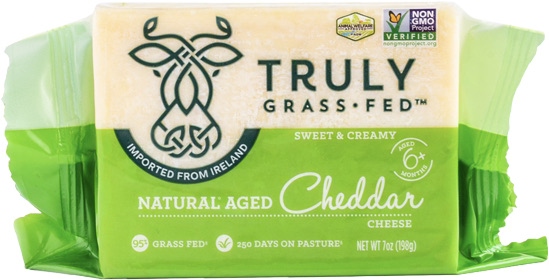
The dairy for Truly Grass Fed comes from over 3,000 farms located across Ireland. Every farm has an average of one cow per two acres. The farms are all Certified Animal Welfare Approved by A Greener World. This independent nonprofit certification program guarantees that the animals are raised outdoors on pastures for their entire lives on farms using sustainable methods. Truly Grass Fed’s cows are able to enjoy and graze on the luscious acres of green pastures for the majority of the year. When it becomes colder in the winter and the grass’ growth slows down, the cows move inside. Indoors, the cattle are provided with grass silage collected from the fields during the summer plus a small amount of concentrates for extra nutrition. Grass makes up 95% of the cow’s diet. The grass on the farms doesn’t require any mechanical irrigation as it’s watered by the bountiful amount of rain which Ireland gets. This also helps the farmers cut down on energy costs. Their grass growth rate exceeds the European average by more than a third. To keep their soil fresh, Truly Grass Fed encourages their ranchers to test their soils every three to five years, add the proper nutrients, and reseed when necessary to replenish the grasses. Their offerings of cheeses come in regular and sharp natural aged cheddar.
Westminster
Westminster is a brand of cheese launched in the United States in 2010 to provide cheese which originated from cows roaming and grazing on rich, lush pastures in Somerset and Cheshire. The cheese is made by hand and graded three times before the selection. Westminster’s types of cheddars are rustic red, smoked, 12 month aged sharp, 18 month aged vintage, and 2 years aged farmer’s reserve.


